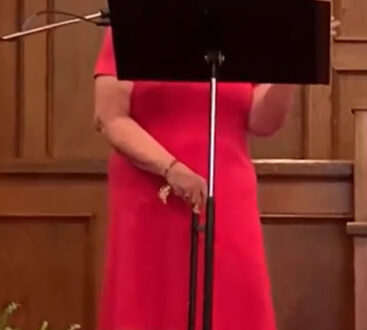Christian Debates
This large group of people whom we call Christians are defined by things like justification by faith, the Apostles’ and the Nicene Creeds, and our hope of resurrection. Within that, we have many distinctives and many beliefs.
This large group of people whom we call Christians are defined by things like justification by faith, the Apostles’ and the Nicene Creeds, and our hope of resurrection. Within that, we have many distinctives and many beliefs.
I believe that it is appropriate to discuss and debate with one another these different beliefs, such as gift of the tongues or the role of women in ministry or the function of communion. These kinds of discussions allow us to refine our faith and learn more not just of what we believe but of our fellow Christians. As we do so, though, we must remember that we do so with our brothers and sisters and that Christ told us that the world will know us by our love.
In this spirit, I’ve asked some friends of mine to join me for the next few posts to discuss the topic of creation. Some Christians believe that God created the world through evolution. Others believe that he did so in six literal days, or some variant on that. As we discuss this issue, I’d like us to keep in mind that the point of the Genesis passage is not a scientific document. That being said, I believe it appropriate to talk about the implications of evolution v. creationism. I’d like to add that both sides are presented by believers who believe God created the world. The debate is on how he created the world. I’d like to introduce the topic with a guest post from Thomas Turner, publisher of Everyday Liturgy blog and journal:
My beliefs about the creation of the world are in essence conservative: my understanding conserves the core understanding of Christian tradition and the historical understanding of the creation, yet I am open to the mystery of creation. For me I don’t need to really pick sides between young earth creationism and theistic evolution, or old earth creationism and theistic evolution, or young earth against old earth. All of these beliefs begin with the claim that God has created the heavens and the earth. I firmly and absolutely believe that. It is central to my faith, and I believe it is a central claim of the Christian faith as well.
But the how? I don’t know. And in all honesty, neither does any one of us, with complete certainty. A helpful motto for the creation vs. evolution discussion, one that should be recovered in much of Christianity, is "let mystery be mystery."
Genesis is the beginning of God’s story. It is also a cultural artifact. It was written not just for people that were pre-Enlightenment, like the medieval saints, it was written for people way back at the brink of knowable history. The stories of Genesis, for there are two, were crafted for a specific culture in a specific time in a specific cultural literature. We must not think we can ever reclaim the mind of the ancient Israelite and how these stories caused philosophical, scientific, and theological discussion. What we do know is this: God as creator is repeated over and over again. It is one of the major themes of God’s story. It appears everywhere. I do not see "God created in six literal days" repeated over and over again in the Bible. Neither do I see "God created through evolutionary principles" repeated over and over again. It’s just not important for our understanding of God’s story. It’s mystery.
So, I believe God created the heavens and the earth, and all things in it. God made human in the imago dei. This I believe. And I really don’t care how long it took or by what means. We will never be able to know for sure. Let mystery be mystery.
More importantly, recovering Genesis as the beginning of God’s story and not the beginning of God’s scientific conference paper removes most of these problems that groups like Answers in Genesis and the like bring up, such as the inerrancy of the Bible, the devaluing of Jesus as the Second Adam, etc. In reality, these dire statements show complete ignorance concerning the basic elements of story and make up for it with an over-reliance on knowledge, man’s knowledge. Let mystery be mystery. And I add to it, let metaphor be metaphor.
Genesis is poetic. It is a myth, in the literary sense that it is a story of epic proportions that bears cultural meaning. Myth does not equal untrue or false. It is a story, and a story that carries great meaning. It certainly does for me, and you, and the Christian faith in general. As C.S. Lewis aptly writes, "Christ is the true myth." He grounds all of our myths: our stories, our meanings, our ideas, our theologies. He is our center. He is the incarnation of everything, the in-fleshing of God’s story. A narrow and scientifically attested veracity of the literalness of Genesis is secondary to the understanding of how King Jesus is the in-fleshing of Genesis, as John provocatively claims at the beginning of his gospel. Jesus is the creation story brought to life. And in that, and no evolutionary or intelligent design theories, do I put my hope and faith.
Thomas Turner authors and manages the Everyday Liturgy blog and journal and is the editor of literary arts at Generate Magazine.



5 Comments
Len
Hi. I stumbled upon your
Hi. I stumbled upon your site and I thought I’d just ask: why do you believe in God?
Heather A. Goodman
Hi, Len. Thanks for
Hi, Len. Thanks for commenting here.
This is a fair and good question, and I will do my best to answer it.
The simplest answer to your question is this: because the Bible tells me so. Of course, that begs the question, how do I know the Bible is true? This can be a long discussion, but I’ll try to give you a couple of short answers.
– The human belief in morality that transcends cultures (e.g. we believe murder to be wrong) and the idea of good and evil (e.g. we believe abusing a child to be evil and vice versa, someone saving that child from abuse to be good) came from more than evolution (meaning a purely secular evolution, unguided by the hand of God). This idea of morality and good v. evil points to a higher power who instilled these beliefs in us. As a Christian, this is best explained not only by the presence of God but by the teaching that he made us in his image.
– The unnecessary elements of the world point to pure grace and joy. The world is more than pragmatic funtionality. We see beauty and color. We look at sunsets and mountains and oceans; we observe the plethora of colors in flowers or the myriad of types of beetles. It’s unlikely that so much variety, and a variety that is unnecessary, would develop out of pure chance. It’s more likely that someone created it. And the fact that he created so much beauty shows his love, joy, and grace as well as his power. Jeremiah 32:17 says, "Oh, Lord God, you did indeed make heaven and earth by your mighty power and great strength. Nothing is too hard for you!"
– As to the truth of the Bible: We have internal evidence (meaning it claims to be true and inspired by God) and external evidence (meaning both the age and number of documents that work together to make up the Bible and outside sources that confirm the truth of the historicity in the Bible such as kings in the Old Testament or the existence and death of Christ in the New Testament). The story of the Bible says that God created the world, that he created humans as pre-eminent in creation and to take care of the world, and that he said all this was good. Humans messed up, and this lead to death: physical death of creation (including humans–we experience this every day), emotional death (another thing we experience!), spiritual death (we rebelled against God), and relational death (a death between humans–as demonstrated in power-mongering, wars, and fights between spouses, siblings, and friends–and a death between man and nature–we continue to fail to take care of it and instead take advantage of it, and nature wars against us with tsunamis and tornadoes). But God in his love decided to redeem the world. Most of the Bible is concerned with how God redeemed, is redeeming, and will redeem the world. In the end, he does. Any beauty and life and goodness we experience now is but a glimpse of the beauty and life and goodness in the redeemed world.
– Finally, I believe because of my experiences. This is my strongest
reason for believing, yet the hardest to explain. I have to be honest,
I haven’t always wanted to believe. I’ve even tried not to believe! (I
think a good book that shows this quandary is the novel Cloudstreet by Tim Winton.) But I can’t shake it. Or perhaps God won’t let me shake him. I grew up in a
Christian home and see the presence of God in everything–in Mother
Teresa’s work to save children, in the blossoming of a flower, in the
love of my husband. None of this is possible without God. You may ask, how do you know your husband
loves you? I could list the reasons: he tells me, the way he touches
me, the way he serves me, the way he brags about me to others, the way
he asks me to join his life and work. And all of those reasons are
important, but to some extent, it’s unexplainable. It’s the same with
God. I know he loves me because he tells me so in the Bible, because
he’s done so much for me, because he’s asked me to join his life and
work. But in some sense, it’s unexplainable. In this area, I’d point to the work of Kierkegaard.
Perhaps that wasn’t as short as I hoped it would be! I’d love to know what you think about God and spiritual matters.
Heather A. Goodman
You know, after all that, I
You know, after all that, I thought of my short answer:
We all live in and according to a story. The story of Christianity makes the most sense to me.
Evan
Thomas hits the nail on the
Thomas hits the nail on the head once again! We have asked Genesis and other (yes, other) biblical creation stories to do more than they were intended to do. Questions like, did God create the world in 6 literal days, or did he use evolution? are questions that the stories aren’t intended to answer. They are myths filled with meaning and truth. Great stuff!
Anonymous
Let mystery be mystery? With
Let mystery be mystery? With that kind of mindset the earth might as well still be considered flat.